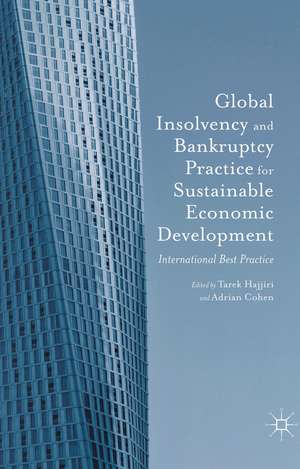Global Insolvency and Bankruptcy Practice for Sustainable Economic Development: International Best Practice
Autor Dubai Economic Council Editat de Kenneth A. Loparo Autor Adrian Cohen Editat de Tarek Hajjirien Limba Engleză Hardback – dec 2015
| Toate formatele și edițiile | Preț | Express |
|---|---|---|
| Hardback (2) | 642.68 lei 6-8 săpt. | |
| Palgrave Macmillan UK – dec 2015 | 642.68 lei 6-8 săpt. | |
| Palgrave Macmillan UK – dec 2015 | 728.91 lei 6-8 săpt. |
Preț: 642.68 lei
Preț vechi: 756.09 lei
-15% Nou
Puncte Express: 964
Preț estimativ în valută:
123.02€ • 133.67$ • 103.40£
123.02€ • 133.67$ • 103.40£
Carte tipărită la comandă
Livrare economică 21 aprilie-05 mai
Preluare comenzi: 021 569.72.76
Specificații
ISBN-13: 9781137561749
ISBN-10: 1137561742
Pagini: 288
Ilustrații: XI, 273 p.
Dimensiuni: 140 x 216 x 18 mm
Greutate: 0.48 kg
Ediția:1st ed. 2015
Editura: Palgrave Macmillan UK
Colecția Palgrave Macmillan
Locul publicării:London, United Kingdom
ISBN-10: 1137561742
Pagini: 288
Ilustrații: XI, 273 p.
Dimensiuni: 140 x 216 x 18 mm
Greutate: 0.48 kg
Ediția:1st ed. 2015
Editura: Palgrave Macmillan UK
Colecția Palgrave Macmillan
Locul publicării:London, United Kingdom
Cuprins
1. Overview of Corporate Restructuring & Insolvency in England and Wales; Adrian Cohen and Gabrielle Ruiz
2. Role of Insolvency Practitioners in Restructuring and Bankruptcy – in the UK; Helen Smithson
3. Maximizing Enterprise Value and Minimizing 'Hold Up Value': Reorganizations in the United States under Chapter 11 of the U.S. Bankruptcy Code; Mitchell A. Seider, Adam J. Goldberg and John Holman
4. The Role of U.S. Judges and Courts in Enforcing U.S. Bankruptcy Law; Judge Arthur Gonzalez
5. The Effects of Business Insolvency on the Duties and Liabilities of Directors and Officers – a Comparative Analysis With Recommendations to Promote Good Decision Making; David Curry and Joe Schorer
6. Global and Regional Practices in Financial Re-Structuring and Bankruptcy Laws: Lessons to be Learned from Singapore; Andrew Chan
2. Role of Insolvency Practitioners in Restructuring and Bankruptcy – in the UK; Helen Smithson
3. Maximizing Enterprise Value and Minimizing 'Hold Up Value': Reorganizations in the United States under Chapter 11 of the U.S. Bankruptcy Code; Mitchell A. Seider, Adam J. Goldberg and John Holman
4. The Role of U.S. Judges and Courts in Enforcing U.S. Bankruptcy Law; Judge Arthur Gonzalez
5. The Effects of Business Insolvency on the Duties and Liabilities of Directors and Officers – a Comparative Analysis With Recommendations to Promote Good Decision Making; David Curry and Joe Schorer
6. Global and Regional Practices in Financial Re-Structuring and Bankruptcy Laws: Lessons to be Learned from Singapore; Andrew Chan
Notă biografică
Adrian is an English law qualified practising solicitor and partner in the international law firm Clifford Chance LLP. He is a member of the finance practice and specialises in the fields of restructuring and insolvency law. He has been with the firm since 1990 and a partner since 1998. He is based in the London office but has an international practice, with a particular interest in the Gulf region. He also acts as co-ordinator of the firm's European insolvency and restructuring practice.
Tarek Hajjiri is Director of Legal Policy within the Legal Policy and Research Centre of the Dubai Economic Council.
Tarek Hajjiri is Director of Legal Policy within the Legal Policy and Research Centre of the Dubai Economic Council.
Textul de pe ultima copertă
How an economy handles financial and business distress has a major impact on confidence in business, the availability of investment, the cost of credit, and economic growth. The financial crisis of 2007-2008 and its aftermath was a catalyst to legal reform in the field of bankruptcy and restructuring law and brought an added focus to the systemic threat of bank failure to the financial system.
This book is a comparative study of international practices in bankruptcy law, providing perspectives from a variety of specialisms including practitioners, lawyers, bankers, accountants and judges from the United Arab Emirates, the UK and Singapore. Including an in-depth study on English, US and Singaporean law, it offers an overview of corporate restructuring and insolvency in England and Wales and the role of insolvency practitioners in the UK. The authors explore the reorganisation process in the United States under chapter 11 of the US Bankruptcy Code, including enforcement perspectives on US bankruptcy law, before providing a comparative analysis of duties and liabilities of directors and officers under US and UK law. The final chapter offers a perspective on financial restructuring and bankruptcy from Singapore.
The authors explore core questions surrounding bankruptcy law, including its ability to facilitate the turnaround of business, to enable efficient reallocation of capital, to provide coherent rules for entrepreneurs, investors, employees, and creditors, and to provide for both appropriate sanctions and for rehabilitation. ?
This book is a comparative study of international practices in bankruptcy law, providing perspectives from a variety of specialisms including practitioners, lawyers, bankers, accountants and judges from the United Arab Emirates, the UK and Singapore. Including an in-depth study on English, US and Singaporean law, it offers an overview of corporate restructuring and insolvency in England and Wales and the role of insolvency practitioners in the UK. The authors explore the reorganisation process in the United States under chapter 11 of the US Bankruptcy Code, including enforcement perspectives on US bankruptcy law, before providing a comparative analysis of duties and liabilities of directors and officers under US and UK law. The final chapter offers a perspective on financial restructuring and bankruptcy from Singapore.
The authors explore core questions surrounding bankruptcy law, including its ability to facilitate the turnaround of business, to enable efficient reallocation of capital, to provide coherent rules for entrepreneurs, investors, employees, and creditors, and to provide for both appropriate sanctions and for rehabilitation. ?







